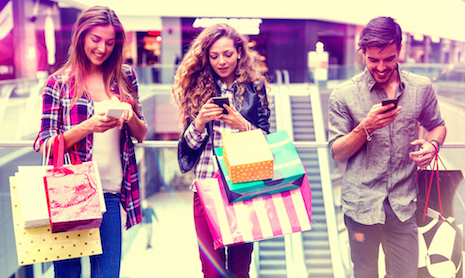 Social media may be one of the best ways for luxury brands to reach Gen Z. Image credit: InMarket
Social media may be one of the best ways for luxury brands to reach Gen Z. Image credit: InMarket
Surprisingly, Generation Z is more likely to be interested in and buy luxury goods than their older millennial counterparts, suggesting that luxury brands should readjust how they view the strategic value of the two demographics. This data comes from InMarket, which published a report called “From Gen Z to Boomers:Ranking Businesses Based on Generational Foot Traffic” seeking to lay out the different shopping habits of each generation. The data showed that Gen Z customers frequent luxury retailers more often than millennials, who prefer discount brands.
"Brands need to show Generation Z that there is a need for luxury in their life," said Pavlina Jaine Osta, a radio personality and millennial expert based in New York, who is unaffiliated with InMarket but agreed to comment in an expert capacity. "That need can be a celebrity branding it as part of the good life, it can be a product that these high tech savvy young people find important."
Generation Z Gen Z is still quite young. Being born after 1995, only the oldest of the generation are now beginning to graduate college and enter the workforce while the majority are still school-aged.
But that has not stopped brands from beginning preliminary research on how best to target and market to Gen Z as well as nailing down exactly what kinds of brands and experiences they prefer. This was one of the main purposes of InMarket’s new report, which looked at the shopping habits of Gen Z, millennials, Gen X and boomers. What the report found may be surprising for some luxury brands. Gen Z prefers luxury more than older gens. Image credit: InMarket
Despite their relative lack of wealth due to their age, Gen Z is more likely to engage with luxury brands than their older counterparts.
Millennial indifference toward luxury is a known phenomenon. In addition to being at an overall economic disadvantage compared to older generations, millennials lived through massive financial crises and are consequently prone to be suspect of frivolous spending.
Gen Z has also grown up on social media more so than any other generation, coloring their perception of how luxury can be used in presenting a certain lifestyle.
Social media
Marketing to Gen Z has taken on many forms in the past few years. Some brands have taken to new technology such as augmented reality.
Augmented reality beauty experiences can drive sales for brands, with a new study on application YouCam Makeup finding that try-on features double conversions.
While the use of augmented reality apps drives purchase intent across younger age groups, the benefit drops off at age 30. Augmented reality is becoming more popular in the beauty retail space, as brands try to replicate the counter experience outside of physical stores (see story).
Social media is also one of the most powerful tools for connecting with Gen Z.
Gen Z prefers luxury more than older gens. Image credit: InMarket
Despite their relative lack of wealth due to their age, Gen Z is more likely to engage with luxury brands than their older counterparts.
Millennial indifference toward luxury is a known phenomenon. In addition to being at an overall economic disadvantage compared to older generations, millennials lived through massive financial crises and are consequently prone to be suspect of frivolous spending.
Gen Z has also grown up on social media more so than any other generation, coloring their perception of how luxury can be used in presenting a certain lifestyle.
Social media
Marketing to Gen Z has taken on many forms in the past few years. Some brands have taken to new technology such as augmented reality.
Augmented reality beauty experiences can drive sales for brands, with a new study on application YouCam Makeup finding that try-on features double conversions.
While the use of augmented reality apps drives purchase intent across younger age groups, the benefit drops off at age 30. Augmented reality is becoming more popular in the beauty retail space, as brands try to replicate the counter experience outside of physical stores (see story).
Social media is also one of the most powerful tools for connecting with Gen Z.
 Gen Z is native to social media. Image credit: InMarket
Members of Gen Z typically spend about 7.6 hours a day on social media. For reference, this is about 33 percent of their day.
All that time is not in one go, of course. Rather, Gen Z is constantly checking and refreshing their social media feeds in short bursts, leaving less time for brands to be able to grab their attention.
Instead, brands should focus on making their content highly sharable, as Gen Z spends a significant amount of time sharing with friends and getting opinions on items before making a purchase (see story).
With Gen Z’s growing love for the luxury industry and their susceptibility to social marketing, luxury brands have a valuable new demographic waiting for them once the majority of Gen Z comes of age in the next few years.
Gen Z is native to social media. Image credit: InMarket
Members of Gen Z typically spend about 7.6 hours a day on social media. For reference, this is about 33 percent of their day.
All that time is not in one go, of course. Rather, Gen Z is constantly checking and refreshing their social media feeds in short bursts, leaving less time for brands to be able to grab their attention.
Instead, brands should focus on making their content highly sharable, as Gen Z spends a significant amount of time sharing with friends and getting opinions on items before making a purchase (see story).
With Gen Z’s growing love for the luxury industry and their susceptibility to social marketing, luxury brands have a valuable new demographic waiting for them once the majority of Gen Z comes of age in the next few years.
"Generation z's spend most of their day on social media, Ms. Osta said. "So a product has to reach them this way.
"They respond really strong to celebrities who have a product as the must have and they are fickle like crazy - one month it's hot to play a game on a clothing site and then next month or even day they are searching for something else."
